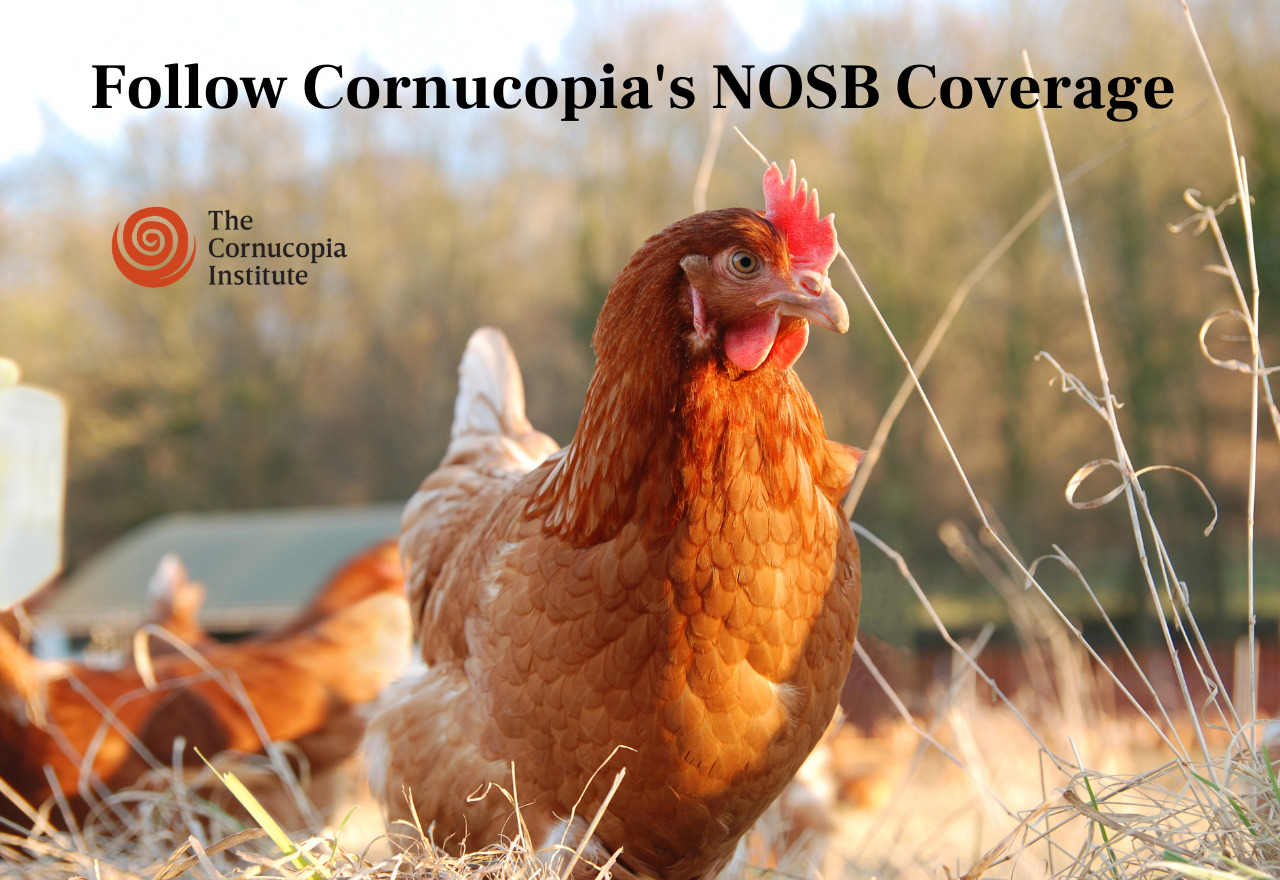Did you miss the recent National Organic Standards Board (NOSB) meeting in Atlanta, Georgia? Cornucopia has you covered!
The NOSB is a federal advisory committee that makes recommendations to the National Organic Program (NOP) on organic materials and standards. The group of volunteers from different areas of the organic community meets twice annually to take public comment, discuss proposals, and review materials that are allowed (or disallowed) in organic production and handling.
The meetings are also a time for stakeholders to connect and discuss important issues in the organic marketplace.
The complete play-by-play notes from the spring 2023 NOSB meeting can be found on Cornucopia’s website. Here’s a summary of the highlights:
Oral Comments
The oral commenting period is a time for organic stakeholders to speak directly to the NOSB and the NOP. Highlights included stakeholders addressing the concern that hydroponic production is being allowed under the certified organic label despite regulatory requirements that organic produce is soil-based. Most commenters noted that because there is no regulatory basis for organic hydroponics it should not be allowed under the organic label. Concerns were also expressed about the production type being rife with fraud because of the lack of standards applying to hydroponic production and the direct competition with authentic soil-based organic production.
Many commentors also contributed to a discussion on the Strengthening Organic Enforcement rulemaking and related anti-fraud efforts to improve organic certification. The farmer input into how commodity tracking could be improved, such as by including field coordinates in Organic System Plans, will prove very helpful to both the NOSB and the NOP as they move forward.
Another highlight was Wild Farm Alliance’s heartfelt appeal to both the NOSB and the NOP to pass the NOSB’s recommendation to protect native ecosystems. Cornucopia has been pushing for the native ecosystem policy change as well.
Cornucopia has notes on the NOSB meeting public comments on its website.
National Organic Program Report
Dr. Jennifer Tucker, Deputy Administrator for the National Organic Program, started with a report about the status of the Organic Transition Initiative (OTI). The Initiative is a $300 million investment to support more farms in transitioning to the organic marketplace. OTI includes several programs, including the Transition to Organic Partnership Program (TOPP) which supports regional efforts to bolster organic transition, including supporting the farmer-to-consumer supply chain.
The TOPP partnership network covers six regions. The Southeast region gave a report about its OTI programs, giving organic stakeholders an inside view of the specific issues organic farmers face in the Southeast region.
Rulemaking Update
The NOP reported on the status of ongoing rulemaking. The Organic Livestock and Poultry Standards Rule is currently being developed into a final rule (analyzing and incorporating the public comment from the proposed rule in 2022). The Strengthening Organic Enforcement rule is entering its enforcement era.
The NOP is also working on a proposed rule for very recent NOSB recommendations related to nitrogen fertilizers and a market development proposed rule (that will address organic pet food and mushrooms).
As for recent rulemakings, the NOP is currently asking for public comment on the information-collection requirements created by the Origin of Livestock final rule. *
NOP is seeking public comment on the burdens, costs, and other effects of the rule, which allows organic operations to request a variance, or exception, from certain livestock sourcing requirements. Interested stakeholders can read more about the issues and submit their comments to the Federal Register.
* The Origin of Livestock final rule “clarified that organic dairy operations may transition nonorganic animals to organic production once—after that, any animals added to an operation must have been organically managed from the last third of gestation. To provide flexibility, the final rule allows small, certified operations to request a variance from the rule’s one-time transition requirement under limited conditions.”
NOSB Discussion
Apart from the NOSB’s evaluation of upcoming sunsets for substances on the National List, the NOSB tackled other issues that have been important to organic stakeholders.
Among the topics the NOSB discussed in detail were:
- Organic is climate smart: The NOSB has created a detailed letter for USDA leaders about all the ways certified organic products are automatically climate smart. With government funding on the horizon for “climate smart” practices, this is an important step for the organic marketplace and stakeholders.
- Crop insurance: Crop insurance often fails organic farmers. The NOSB discussed the ways that crop insurance is problematic to organic farmers and how it could be improved.
- Organic Research priorities: The NOSB discussed various research priorities for organic production and handling. Among the highlights were support for research into PFAS (“forever chemicals”) alternatives and remediation, the economic impacts of GMOs on organic crops, and the extent and impact of plastic use on organic farms.
- Ion exchange filtration resins: The NOSB voted on a proposed change to add ion exchange resins used in the ion exchange filtration process to the National List. Its recommendation to the National Organic Program was that the resins are not required to be on List. The NOSB’s recommendation outlined instructions for the NOP to provide certifiers.
- Consistent location identification (GPS): The NOSB discussed how identifying specific GPS information for each field (since addresses often fall short in tracking specific parcel information) could improve organic data tracking and prevent fraud. It also discussed hurdles to this kind of tracking and potential solutions.
For more on what the NOP has been working on, the Organic Learning Center has a National Organic Program Spring 2023 Update that is free for everyone to view (with signup).


